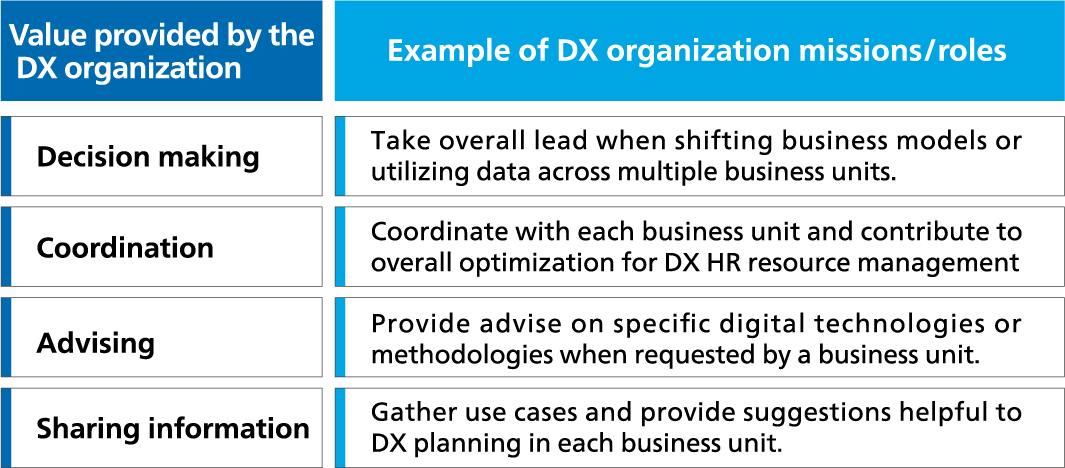Decision making
In some cases, the DX organization takes on the role of making decisions on new business models.
They work with external organizations to take responsibility for planning, including scheme design, for new business models leveraging digital technology(e.g. transition from contract fee based to contingent fee based), something often difficult for existing business units to do on their own. There are also cases where the DX organization takes on overall lead from the standpoint of data utilization when building new businesses that combine different business units, such as smart city related business models. In cases where the DX organization exercises business leadership functionality, they are required to have not only knowledge of digital tech, but also the ability to plan revenue models and business schemes.
Coordination
In some cases, the DX organization exercises a coordinating function between related divisions in order to solve company-wide issues.
For example, some DX organizations provide coordination for resource management related to DX personnel.
While sometimes the rare DX personnel may be assigned to the DX organization itself, most have fixed assignments to specific business units, resulting in hiring and training individually optimized for that unit. There have been cases where having the DX organization coordinate with each business unit throughout the entirety of the resource management process, from defining HR requirements to the hiring and training plan, the DX organization has come to be expected to make a contribution to solving the considerable challenge of the personnel shortage.
Advising
In some cases, the DX organization provides specialist advice in response to requests from business units and subsidiaries.
Often when business units embark on digital transformation on their own, they require not only support in terms of digital technology and knowhow, but on the approach to planning the transformation itself. To prepare for such needs, the DX organization should accumulate knowledge in the digital technology domain that can be applied across the company’s business activities, as well as prepare methodologies for moving forward with planning.
For example, there are cases where the DX organization gathers knowledge on digital image recognition in preparation for the digitalization of business unit maintenance services, or provides consulting to business units on how to plan digital transformation strategy.
Sharing information
The DX organization sometimes also serves as a hub to gather digital transformation examples from a wide range of sources and promote the sharing thereof throughout the overall organization.
There are powerful needs for reference materials in the early stages of DX planning, including case studies from other companies. Therefore, the DX organization is expected to collect pertinent use cases, including advanced case studies. As planning proceeds, it becomes important for business units to interpret suggestions for their own activities from the case studies, and this is another stage at which the DX organization is expected to provide information.
Many companies continue working on the mission and roles of their DX organizations, but it is important to define those aspects in light of the unique situation in each company. We hope that the examples above help you define the right DX organization for your company.



